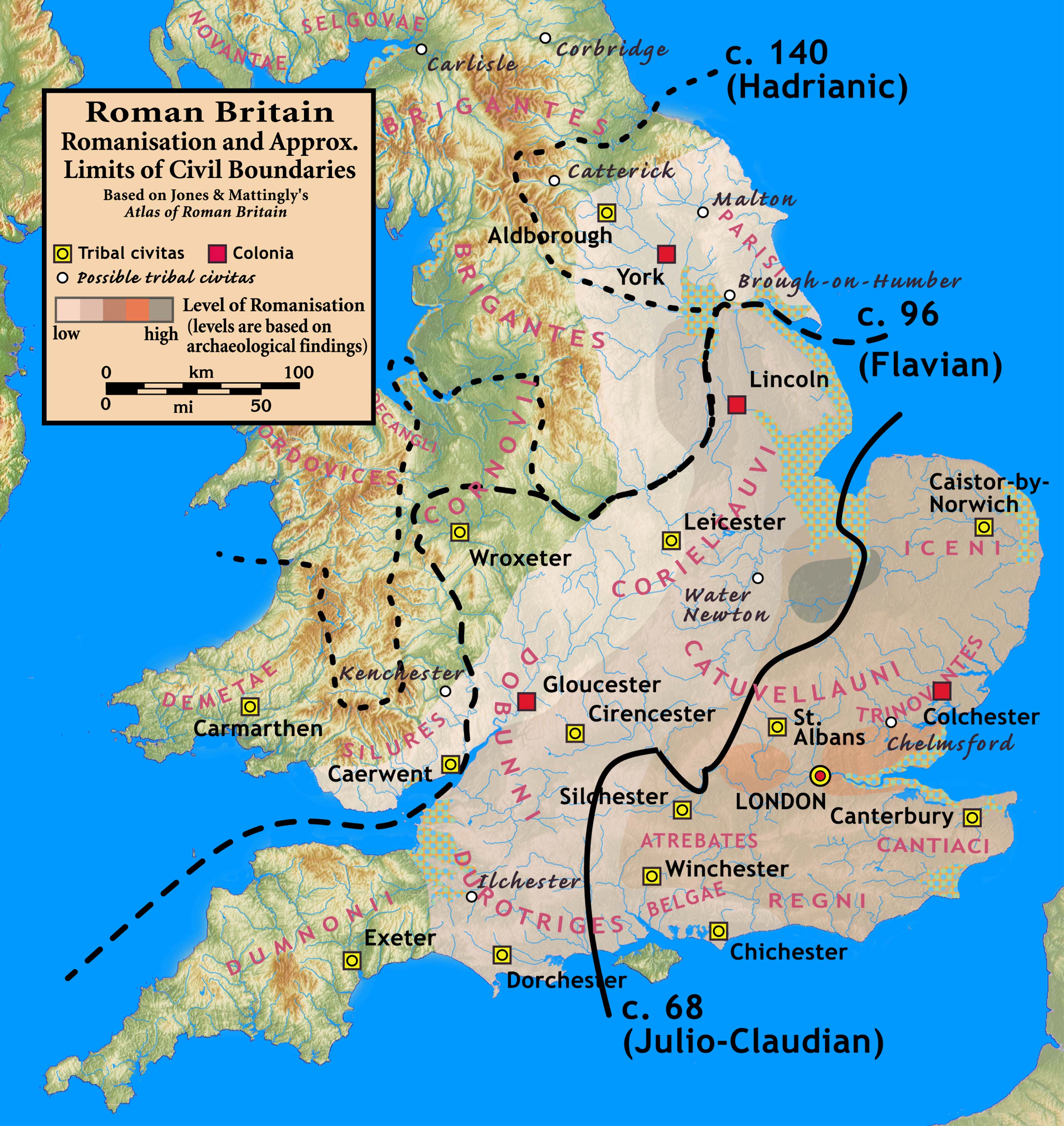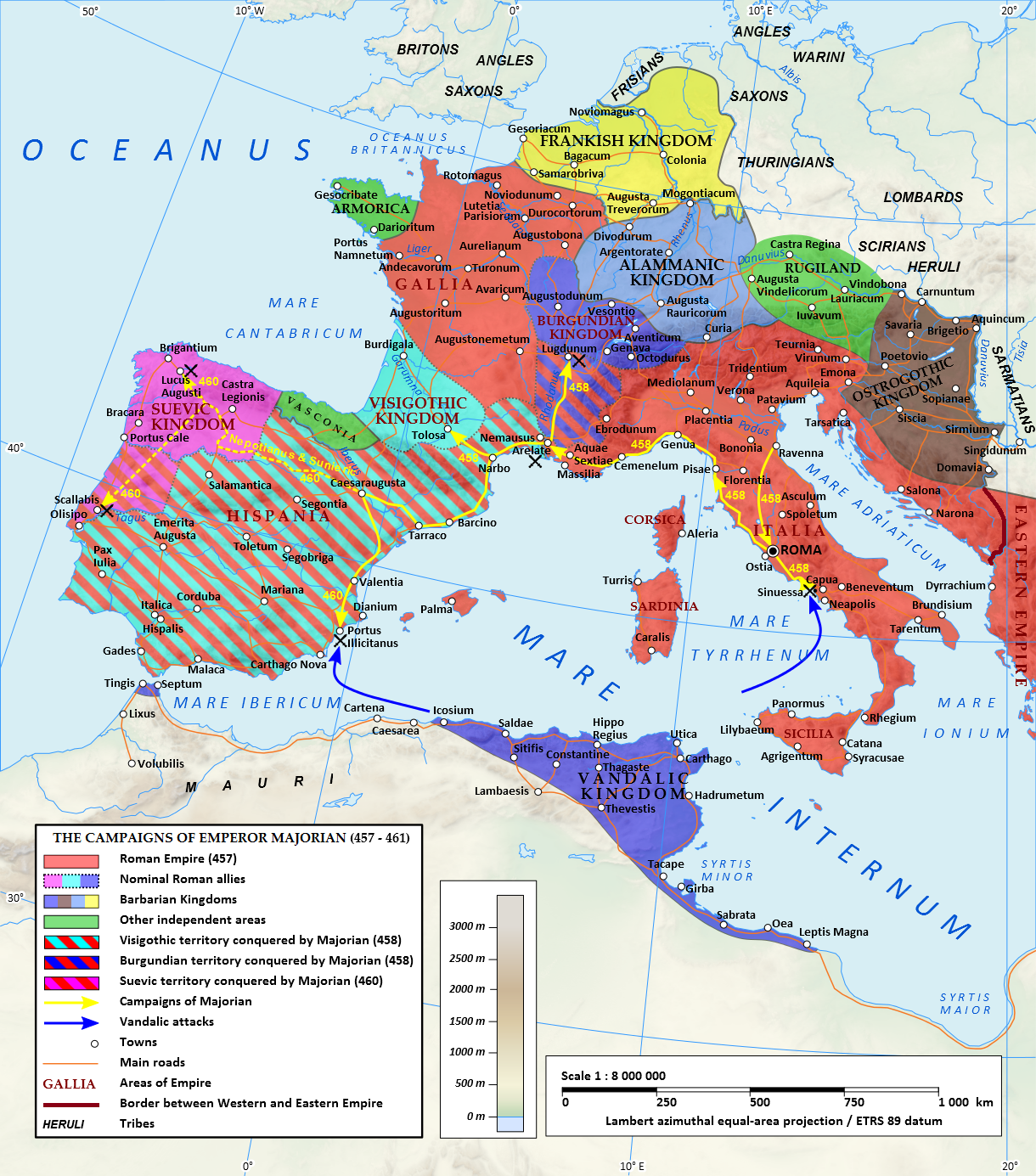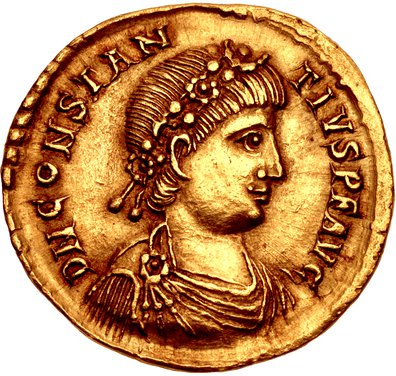|
The Last Of The Romans
The term Last of the Romans () has historically been used to describe a person thought to embody the values of ancient Roman civilization – values which, by implication, became extinct on his death. It has been used to describe a number of individuals. The first recorded instance was Julius Caesar's description of Marcus Junius Brutus as the one with whom the old Roman spirit would become extinct. List of people described as the "Last of the Romans" In ancient and early medieval Mediterranean * Gaius Cassius Longinus (d. 42 BC), so called by Brutus and by the ancient historian Aulus Cremutius Cordus. * Gaius Asinius Pollio (75 BC – AD 4), one of the last great orators and writers of the Roman Republic. * Valentinian I (321–375), the last Western Emperor to campaign extensively on both sides of the Rhine and Danube frontiers. * Valens (328–378), "the Last True Roman" Eastern Emperor (and brother of Valentinian I) who led his army to a catastrophic defeat in the ... [...More Info...] [...Related Items...] OR: [Wikipedia] [Google] [Baidu] |
Valens Honorius Musei Capitolini MC494
Valens (; ; 328 – 9 August 378) was Roman emperor from 364 to 378. Following a largely unremarkable military career, he was named co-emperor by his elder brother Valentinian I, who gave him the Byzantine Empire, eastern half of the Roman Empire to rule. In 378, Valens was defeated and killed at the Battle of Adrianople against the invading Goths, which astonished contemporaries and marked the beginning of barbarian encroachment into Roman territory. As emperor, Valens continually faced threats both internal and external. He defeated, after some dithering, the usurper Procopius (usurper), Procopius in 366, and campaigned against the Goths across the Danube in 367 and 369. In the following years, Valens focused on the eastern frontier, where he faced the perennial threat of Sasanian Empire, Persia, particularly in Kingdom of Armenia (antiquity), Armenia, as well as additional conflicts with the Saracens and Isaurians. Domestically, he inaugurated the Aqueduct of Valens in Cons ... [...More Info...] [...Related Items...] OR: [Wikipedia] [Google] [Baidu] |
Edward Gibbon
Edward Gibbon (; 8 May 173716 January 1794) was an English essayist, historian, and politician. His most important work, ''The History of the Decline and Fall of the Roman Empire'', published in six volumes between 1776 and 1789, is known for the quality and irony of its prose, its use of primary sources, and its polemical Criticism of religion, criticism of organized religion. Early life: 1737–1752 Edward Gibbon was born in 1737, the son of Edward Gibbon (died 1770), Edward and Judith Gibbon, at Lime Grove in the town of Putney, Surrey. He had five brothers and one sister, all of whom died in infancy. His grandfather, also named Edward, had lost his assets as a result of the South Sea Company, South Sea bubble stock-market collapse in 1720 but eventually regained much of his wealth. Gibbon's father thus inherited a substantial estate. His paternal grandmother, Catherine Acton, was granddaughter of Sir Walter Acton, 2nd Baronet. Gibbon described himself as "a puny child, neg ... [...More Info...] [...Related Items...] OR: [Wikipedia] [Google] [Baidu] |
Romano-British
The Romano-British culture arose in Britain under the Roman Empire following the Roman conquest in AD 43 and the creation of the province of Britannia. It arose as a fusion of the imported Roman culture with that of the indigenous Britons, a people of Celtic language and custom. Scholars such as Christopher Snyder believe that during the 5th and 6th centuries – approximately from 410 when the Roman legions withdrew, to 597 when St Augustine of Canterbury arrived – southern Britain preserved an active sub-Roman culture that survived the attacks from the Anglo-Saxons and even used a vernacular Latin when writing. Arrival of the Romans Roman troops, mainly from nearby provinces, invaded in AD 43, in what is now part of England, during the reign of Emperor Claudius. Over the next few years the province of Britannia was formed, eventually including the whole of what later became England and Wales and parts of Scotland.Kinder, H. & Hilgemann W. ''The Penguin Atlas of Wo ... [...More Info...] [...Related Items...] OR: [Wikipedia] [Google] [Baidu] |
Ambrosius Aurelianus
Ambrosius Aurelianus (; Anglicised as Ambrose Aurelian and called Aurelius Ambrosius in the ''Historia Regum Britanniae'' and elsewhere) was a war leader of the Romano-British who won an important battle against the Anglo-Saxons in the 5th century, according to Gildas. He also appeared independently in the legends of the Britons, beginning with the 9th-century '' Historia Brittonum''. Eventually, he was transformed by Geoffrey of Monmouth into the uncle of King Arthur, the brother of Arthur's father Uther Pendragon, as a ruler who precedes and predeceases them both. He also appears as a young prophet who meets the tyrant Vortigern; in this guise, he was later transformed into the wizard Merlin. According to Gildas Ambrosius Aurelianus is one of the few people whom Gildas identifies by name in his sermon ''De Excidio et Conquestu Britanniae'', and the only one named from the 5th century. ''De Excidio'' is considered the oldest extant British document about the so-called Arth ... [...More Info...] [...Related Items...] OR: [Wikipedia] [Google] [Baidu] |
Majorian
Majorian (; 7 August 461) was Western Roman emperor from 457 to 461. A prominent commander in the Late Roman army, Western military, Majorian deposed Avitus in 457 with the aid of his ally Ricimer at the Battle of Placentia (456), Battle of Placentia. Possessing little more than Roman Italy, Italy and Dalmatia (Roman province), Dalmatia, as well as some territory in Hispania Tarraconensis, Hispania and northern Roman Gaul, Gaul, Majorian campaigned rigorously for three years against the Empire's enemies. In 461, he was murdered at Dertona in a conspiracy, and his successors until the Fall of the Western Roman Empire, fall of the Empire in 476 were puppets either of barbarian generals or the Byzantine Empire, Eastern Roman court. After Battle of Garigliano (457), defeating a Vandal attack on Italy in 457, Majorian intercepted the Visigoths in the Battle of Arelate, defeating them and saving the city. Securing Septimania, he reduced the Goths to Foederati, federate status, returning ... [...More Info...] [...Related Items...] OR: [Wikipedia] [Google] [Baidu] |
Valentinian III
Valentinian III (; 2 July 41916 March 455) was Roman emperor in the Western Roman Empire, West from 425 to 455. Starting in childhood, his reign over the Roman Empire was one of the longest, but was dominated by civil wars among powerful generals and the Migration Period, barbarian invasions. He was the son of Galla Placidia and Constantius III, and as the great-grandson of Valentinian I () he was the last emperor of the Valentinianic dynasty. As a grandson of Theodosius I (), Valentinian was also a member of the Theodosian dynasty, to which his wife, Licinia Eudoxia, also belonged. A year before assuming the rank of ''Augustus (title), augustus'', Valentinian was given the imperial rank of ''Caesar (title), caesar'' by his half-cousin and co-emperor Theodosius II (). The ''Augusta (title), augusta'' Galla Placidia had great influence during her son's rule, as did the military commander Flavius Aetius, who defended the western empire against List of ancient Germanic peoples, Ger ... [...More Info...] [...Related Items...] OR: [Wikipedia] [Google] [Baidu] |
Constantius III
Constantius III (died 2 September 421) was briefly Western Roman emperor in 421, having earned the throne through his capability as a general under Honorius. By 411 he had achieved the rank of ''magister militum'', and in the same year he suppressed the revolt of the usurper Constantine III. Constantius went on to lead campaigns against various barbarian groups in Hispania and Gaul, recovering much of both for the Western Roman Empire. He married Honorius's sister Galla Placidia in 417, a sign of his ascendant status, and was proclaimed co-emperor by Honorius on 8 February 421. Constantius reigned for seven months before dying on 2 September 421. Life Early life Constantius was born in Naissus, Moesia, (present-day Niš, Serbia) of Illyrian origin. Constantius served as a general under Honorius, rising to the rank of ''Magister militum'' (Master of the Soldiers) by 411. Revolt of Constantine III In 411 Constantius was sent by Honorius to put down the revolt of Const ... [...More Info...] [...Related Items...] OR: [Wikipedia] [Google] [Baidu] |
Galla Placidia
Galla Placidia (392/3 – 27 November 450), daughter of the Roman emperor Theodosius I, was the mother and a tutor and advisor to emperor Valentinian III. She was queen consort to Ataulf, King of the Visigoths from 414 until his death in 415, briefly empress consort to Constantius III in 421, and managed the government administration as a regent during the early reign of Valentinian III until her death. Family Placidia was the daughter of Theodosius I and his second wife, Galla, who was herself daughter of Valentinian I and his second wife, Justina. Galla Placidia's date of birth is not recorded, but she must have been born either in the period 388–89 or 392–93. Between these dates, her father was in Italy following his campaign against the usurper Magnus Maximus, while her mother remained in Constantinople. A surviving letter from Bishop Ambrose of Milan, dated 390, refers to a younger son of Theodosius named Gratianus, who died in infancy; as Gratian must have been bo ... [...More Info...] [...Related Items...] OR: [Wikipedia] [Google] [Baidu] |
Bonifacius
Bonifatius (or Bonifacius; also known as Count Boniface or Comes Bonifacius; died 432) was a Roman general and governor of the diocese of Africa. He campaigned against the Visigoths in Gaul and the Vandals in North Africa. An ally of Galla Placidia, mother and advisor of Valentinian III, Bonifacius engaged in Roman civil wars on her behalf against the generals Felix in 427-429 and Aetius in 432. Although he defeated the latter at the Battle of Rimini, Bonifacius suffered a fatal wound and was succeeded by his son-in-law Sebastianus as '' patricius'' of the Western Roman Empire. Biography Early career Bonifatius first appears as a general of Constantius III in 413, where he defeated the Visigoths of Athaulf at Massilia; he allegedly threw a weapon and wounded the Gothic king himself. Later that decade, Bonifatius was known to be a ''tribunus'' commanding a Gothic regiment of ''foederati'' in North Africa campaigning against the Mauri, and had a friendship with St. ... [...More Info...] [...Related Items...] OR: [Wikipedia] [Google] [Baidu] |
Procopius
Procopius of Caesarea (; ''Prokópios ho Kaisareús''; ; – 565) was a prominent Late antiquity, late antique Byzantine Greeks, Greek scholar and historian from Caesarea Maritima. Accompanying the Roman general Belisarius in Justinian I, Emperor Justinian's wars, Procopius became the principal Roman historian of the 6th century, writing the ''History of the Wars'', the ''Buildings'', and the ''Secret History''. Early life Apart from his own writings, the main source for Procopius's life is an entry in the ''Suda'',Suda pi.2479. See under 'Procopius' oSuda On Line a Byzantine Greek encyclopaedia written sometime after 975 which discusses his early life. He was a native of Caesarea Maritima, Caesarea in the Roman province, province of ''Palaestina Prima''. He would have received a conventional upper-class education in the Greek literature, Greek classics and rhetoric, perhaps at the famous Rhetorical School of Gaza, school at Gaza. He may have attended law school, possibly at La ... [...More Info...] [...Related Items...] OR: [Wikipedia] [Google] [Baidu] |
Catalaunian Fields
The Battle of the Catalaunian Plains (or Fields), also called the Battle of the Campus Mauriacus, Battle of Châlons, Battle of Troyes or the Battle of Maurica, took place on June 20, 451 AD, between a victorious coalition, led by the Roman general Flavius Aetius and the Visigothic king Theodoric I, against the Huns and their vassals, commanded by their king, Attila. It proved to be one of the last major military operations of the Western Roman Empire, although Germanic ''foederati'' composed the majority of the coalition army. The exact strategic significance is disputed. Historians generally agree that the siege of Aurelianum was the decisive moment in the campaign and stopped the Huns' attempt to advance any further into Roman territory or establish vassals in Roman Gaul. However, the Huns looted and pillaged much of Gaul and crippled the military capacity of the Romans and Visigoths. Attila died only two years later, in 453. After the Battle of Nedao in 454, the coali ... [...More Info...] [...Related Items...] OR: [Wikipedia] [Google] [Baidu] |
Attila
Attila ( or ; ), frequently called Attila the Hun, was the ruler of the Huns from 434 until his death in early 453. He was also the leader of an empire consisting of Huns, Ostrogoths, Alans, and Gepids, among others, in Central Europe, Central and Eastern Europe. As nephews to Rugila, Attila and his elder brother Bleda succeeded him to the throne in 435, ruling jointly until the death of Bleda in 445. During his reign, Attila was one of the most feared enemies of the Western Roman Empire, Western and Byzantine Empire, Eastern Roman Empires. He crossed the Danube twice and plundered the Balkans but was unable to take Constantinople. In 441, he led an invasion of the Eastern Roman (Byzantine) Empire, the success of which emboldened him to invade the West. He also attempted to conquer Roman Gaul (modern France), crossing the Rhine in 451 and marching as far as Aurelianum (Orléans), before being stopped in the Battle of the Catalaunian Plains. He subsequently invaded Roman ... [...More Info...] [...Related Items...] OR: [Wikipedia] [Google] [Baidu] |








